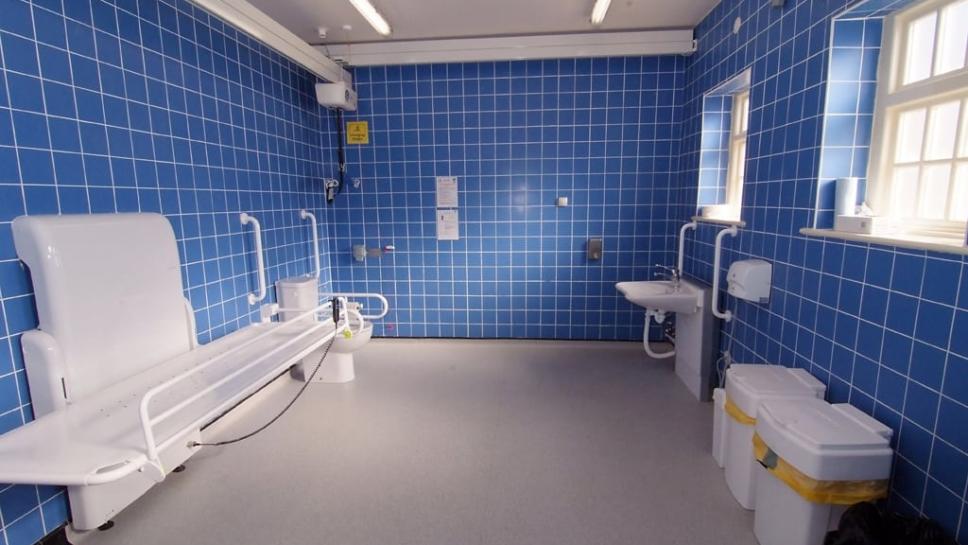
- The Changing Places Consortium is calling for a facility in all large railway stations, and for law changes to make Changing Places toilets mandatory in new large public building
- Cities and large towns including Salford and Luton do not have any fully accessible toilets for people with severe disabilities
New research by the Changing Places Consortium reveals that just 12 railway stations in the UK have a Changing Places toilet. That means that disabled people face the choice of not going out, not using trains or lying down on dirty toilet floors to be changed.
Fully accessible toilets needed by more than a quarter of a million people across the UK should be available in every town, says the Changing Places Consortium, and yet Salford, Luton and Basildon are the UK’s biggest towns and cities that are yet to register one.
Changing Places toilets are bigger than standard accessible ones, and are used by people with severe disabilities, including children and adults with muscle-wasting conditions, cerebral palsy, motor neurone disease, and multiple sclerosis.
To mark Changing Places Awareness Day on 19 July, the Changing Places Consortium has carried out research on the facilities registered across the UK. It has found:
- Out of more than 2,500 train stations in the UK, just 12 have a registered Changing Places toilet – less than 0.5%
- Only 17 pubs, restaurants or cafés across the whole UK have registered Changing Places toilets
Having access to Changing Places toilets increases independence and improves quality of life. When venues such as railway stations, restaurants, pubs and cafés do not have any facilities, it can leave disabled people isolated, forcing them to consider options as extreme as surgery or not leaving the house, and making a day out with friends or getting to work a challenge.
The Changing Places Consortium has also found the 10 biggest towns and cities with no Changing Places toilets. Greater Manchester and Gloucestershire each have two entries on the list, which is as follows:
- Salford, Greater Manchester
- Luton, Bedfordshire
- Stockton-on-Tees, County Durham
- Gloucester, Gloucestershire
- Sale, Greater Manchester
- Nuneaton, Warwickshire
- Cheltenham, Gloucestershire
- Hove, East Sussex
- Basildon, Essex
- Falkirk, Scotland *two new Changing Places toilets have now been installed, and more are planned
The consortium is calling for a Changing Places toilet in all large railway stations. A joint publication by the Department for Transport and Transport Scotland in 2011 makes the same recommendation – yet most Category A stations still have no such facility.
The group is also pushing for at least one toilet in every town, and is emphasising the need for changes to legislation to make Changing Places toilets mandatory in new large public buildings. It follows a Ten Minute Rule Bill presented in Parliament last month by Paula Sherriff MP, calling for certain buildings to provide these facilities.
Fiona Anderson, 29, lives in Bolton in Greater Manchester. Fiona, who has a condition called multiminicore myopathy, is unable to use regular disabled toilets, as they are too small to accommodate her powerchair. She said:
“A lack of Changing Places toilets has led to me deciding to have surgery, which will give me more freedom to go to the toilet. If these facilities were in every large public building, I would no longer have to endure the pain of postponing going to the toilet all day and the ever-present dark cloud of sepsis occurring would be lifted. Ultimately, I also wouldn’t need to have a catheter fitted, which would mean the world to me. I’m not incontinent – I simply can’t transfer to a toilet without a hoist, and need an adult-sized changing bench.
“Changing Places toilets are a much-needed lifeline. But with so few of them available, people like me are forced to sacrifice our dignity and independence.”
Nic Bungay, Director of Campaigns, Care and Information at Muscular Dystrophy UK, said:
“Having access to Changing Places toilets gives people greater independence, but there are still far too many places without these facilities. That means that disabled people who live in, or visit, these areas face the choice of not going out or lying down on dirty toilet floors to be changed.
“The consortium would like to see Changing Places toilets made compulsory in all new large public buildings, and we will be pushing for legislation to make this reality. We will not rest until Changing Places toilets become commonplace across the UK.”
To view a full list of registered facilities, visit: http://changingplaces.uktoiletmap.org/
ENDS
For media enquiries, please contact Laura Burge, senior press officer, Muscular Dystrophy UK, on: l.burge@musculardystrophyuk.org or: 0207 803 2870.

